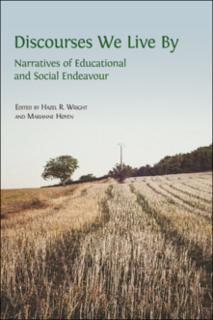| dc.contributor.author | Wallin, Patric | |
| dc.date.accessioned | 2020-08-27T07:40:26Z | |
| dc.date.available | 2020-08-27T07:40:26Z | |
| dc.date.created | 2020-08-18T13:59:00Z | |
| dc.date.issued | 2020 | |
| dc.identifier.isbn | 978-1-78374-851-8 | |
| dc.identifier.uri | https://hdl.handle.net/11250/2675303 | |
| dc.description.abstract | This chapter examines the practices through which a cohort of
Swedish upper-secondary pupils manage their learning processes
to avoid the possibility of their teachers doubting their study abilities.
It explains how, in contemporary Sweden, a country where the
outlook is increasingly neoliberal, university places are competitively
awarded, creating concern among students that asking for support
might mark them as unsuitable for university entrance. The research
uses in-class observations and focus-group interviews to establish
how two classes of students actually manage this dilemma and finds
an interesting paradox — that the student practices potentially create
both negative and positive consequences for their success. By seeking
teacher approval rather than teacher assistance they cut themselves off
from an established effective form of academic support, but by turning
to their own resources and discussing their studies with their fellow
students, they improve their capacity to learn independently and
work in a group of peers, important skills for higher-level study and
for working life. Thus, the competitive practices common in neoliberal
economies actually encourage the students to work cooperatively even
as they strive to attain the high levels of success needed to guarantee a
place in a prestigious university, at least in the context of natural science
education, when carrying out laboratory work within the discipline of
chemistry. This study is limited in scope in terms of subject coverage, but
this context was chosen because the more practical format of such work
offers opportunities to observe students learning though action rather
than see them being taught didactically and thereby makes studentteacher interaction an option rather than a prerequisite. | en_US |
| dc.language.iso | eng | en_US |
| dc.publisher | Open Book Publishers | en_US |
| dc.relation.ispartof | Discourses We Live By: Narratives of Educational and Social Endeavour | |
| dc.rights | Navngivelse 4.0 Internasjonal | * |
| dc.rights.uri | http://creativecommons.org/licenses/by/4.0/deed.no | * |
| dc.title | Navigating Grades and Learning in the Swedish Upper Secondary School Where Neoliberal Values Prevail | en_US |
| dc.type | Chapter | en_US |
| dc.description.version | publishedVersion | en_US |
| dc.identifier.doi | 10.11647/obp.0203.15 | |
| dc.identifier.cristin | 1823845 | |
| dc.description.localcode | This work is licensed under a Creative Commons Attribution 4.0 International license (CC BY 4.0). This license allows you to share, copy, distribute and transmit the text; to adapt the text and to make commercial use of the text providing attribution is made to the authors (but not in any way that suggests that they endorse you or your use of the work). Attribution should include the following information: Hazel R. Wright and Marianne Høyen (eds), Discourses We Live By: Narratives of Educational and Social Endeavour. Cambridge, UK: Open Book Publishers, 2020, https:// doi.org/10.11647/OBP.0203 | en_US |
| cristin.ispublished | true | |
| cristin.fulltext | original | |
| cristin.qualitycode | 1 | |

